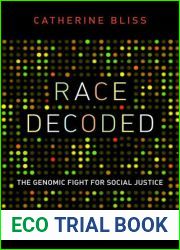
BOOKS - Race Decoded: The Genomic Fight for Social Justice

Race Decoded: The Genomic Fight for Social Justice
Author: Catherine Bliss
Year: May 23, 2012
Format: PDF
File size: PDF 1.8 MB
Language: English

Year: May 23, 2012
Format: PDF
File size: PDF 1.8 MB
Language: English

Race Decoded: The Genomic Fight for Social Justice In the year 2000, the success of the Human Genome Project led scientists to declare the death of race in biology and medicine. However, within five years, many of these same scientists had reversed course and embarked on a new hunt for the biological meaning of race. Drawing on personal interviews and life stories, Race Decoded takes us into the world of elite genome scientists, including Francis Collins, director of the NIH; Craig Venter, the first person to create a synthetic genome; and Spencer Wells, National Geographic Society explorer-in-residence, among others, to show how and why they are formulating new ways of thinking about race. This original exploration by Catherine Bliss reveals a paradigm shift both at the level of science and society from colorblindness to racial consciousness. Scientists have been fighting against older understandings of race in biology while simultaneously promoting a new grand-scale program of minority inclusion. In selecting research topics or considering research design, scientists routinely draw upon their personal experiences of race to push the public to think about race as a biosocial entity.
Раса расшифрована: Геномная борьба за социальную справедливость В 2000 году успех проекта «Геном человека» побудил ученых объявить о смерти расы в биологии и медицине. Однако в течение пяти лет многие из этих же ученых изменили курс и начали новую охоту за биологическим значением расы. Опираясь на личные интервью и жизненные истории, Race Decoded переносит нас в мир элитных ученых в области генома, включая Фрэнсиса Коллинза, директора NIH; Крейг Вентер, первый человек, создавший синтетический геном; и Спенсер Уэллс, исследователь-резидент Национального географического общества, чтобы показать, как и почему они разрабатывают новые способы мышления о расе. Это оригинальное исследование Кэтрин Блисс обнаруживает сдвиг парадигмы как на уровне науки, так и общества от колорблиндности к расовому сознанию. Ученые борются против более старого понимания расы в биологии, одновременно продвигая новую масштабную программу включения меньшинств. Выбирая темы исследований или рассматривая дизайн исследований, ученые обычно опираются на свой личный опыт расы, чтобы подтолкнуть общественность к мысли о расе как о биосоциальной сущности.
Race décryptée : La lutte génomique pour la justice sociale En 2000, le succès du projet Génome humain a incité les scientifiques à annoncer la mort de la race en biologie et en médecine. Cependant, en cinq ans, beaucoup de ces mêmes scientifiques ont changé de cap et ont commencé une nouvelle chasse à l'importance biologique de la race. S'appuyant sur des entrevues personnelles et des histoires de vie, Race Decoded nous emmène dans le monde des scientifiques élites du génome, dont Francis Collins, directeur du NIH ; Craig Venter, le premier homme à créer un génome synthétique ; et Spencer Wells, chercheur résident de la National Geographic Society, pour montrer comment et pourquoi ils développent de nouvelles façons de penser la race. Cette étude originale de Kathryn Bliss révèle un changement de paradigme tant au niveau de la science que de la société, passant de la coloroblindie à la conscience raciale. s scientifiques luttent contre l'ancienne compréhension de la race en biologie, tout en promouvant un nouveau programme d'inclusion des minorités à grande échelle. En choisissant des thèmes de recherche ou en considérant la conception de la recherche, les scientifiques s'appuient généralement sur leur expérience personnelle de la race pour pousser le public à penser que la race est une entité biosociale.
Raza descifrada: La lucha genómica por la justicia social En 2000, el éxito del Proyecto Genoma Humano llevó a los científicos a anunciar la muerte de la raza en biología y medicina. n embargo, durante cinco , muchos de estos mismos científicos cambiaron de rumbo y comenzaron una nueva caza por el significado biológico de la raza. Apoyándonos en entrevistas personales e historias de vida, Race Decoded nos traslada al mundo de científicos de élite en el ámbito del genoma, entre ellos Francis Collins, director del NIH; Craig Venter, el primer hombre en crear un genoma sintético; y Spencer Wells, investigador residente de la National Geographic Society, para mostrar cómo y por qué están desarrollando nuevas formas de pensar sobre la raza. Este estudio original de Catherine Bliss revela un cambio de paradigma tanto a nivel de la ciencia como de la sociedad desde el colorismo hacia la conciencia racial. científicos luchan contra una comprensión más antigua de la raza en biología, al tiempo que promueven un nuevo programa a gran escala para incluir a las minorías. Al elegir temas de investigación o considerar el diseño de la investigación, los científicos generalmente se basan en sus experiencias personales de raza para empujar al público a pensar en la raza como una entidad biosocial.
Raça decifrada: Luta genômica por justiça social Em 2000, o sucesso do projeto Genoma Humano levou os cientistas a anunciarem a morte da raça em biologia e medicina. No entanto, ao longo de cinco anos, muitos desses mesmos cientistas mudaram de rumo e iniciaram uma nova caça ao significado biológico da raça. Com base em entrevistas pessoais e histórias de vida, a Race Decoded transporta-nos para o mundo dos cientistas de elite do genoma, incluindo Francis Collins, diretor da NIH; Craig Venter, o primeiro homem a criar o genoma sintético; e Spencer Wells, pesquisador residente da National Geographic Society, para mostrar como e por que estão a desenvolver novas formas de pensar sobre a raça. Este estudo original de Katherine Bliss revela uma mudança de paradigma, tanto no nível da ciência como na sociedade, da sensibilidade para a consciência racial. Os cientistas lutam contra a compreensão mais antiga da raça na biologia, enquanto promovem um novo e amplo programa de inclusão de minorias. Escolhendo temas de pesquisa ou considerando o design da pesquisa, os cientistas geralmente se baseiam na sua experiência pessoal da raça para levar o público a pensar a raça como uma essência biossocial.
Razza decifrata: la lotta genomica per la giustizia sociale Nel 2000 il successo del progetto Genoma Umano ha spinto gli scienziati ad annunciare la morte della razza in biologia e medicina. Ma nel giro di cinque anni, molti di questi scienziati hanno cambiato rotta e hanno iniziato una nuova caccia al significato biologico della razza. Basandoci su interviste personali e storie di vita, Race Decoded ci trasferisce nel mondo degli scienziati del genoma di elite, tra cui Francis Collins, direttore del NIH; Craig Venter, il primo uomo a creare un genoma sintetico; e Spencer Wells, ricercatore residente della National Geographic Society, per dimostrare come e perché stanno sviluppando nuovi modi di pensare alla razza. Questo originale studio di Katherine Bliss rivela un cambiamento di paradigma, sia a livello scientifico che sociale, dalla sensibilità alla coscienza razziale. Gli scienziati si battono contro una più vecchia comprensione della razza in biologia, promuovendo allo stesso tempo un nuovo e ampio programma di inclusione delle minoranze. Scegliendo temi di ricerca o trattando la progettazione della ricerca, gli scienziati di solito si basano sulla loro esperienza personale di razza per spingere il pubblico a pensare la razza come una natura biosociale.
Rasse entschlüsselt: Genomischer Kampf für soziale Gerechtigkeit Im Jahr 2000 veranlasste der Erfolg des Human Genome Project Wissenschaftler, den Tod der Rasse in Biologie und Medizin anzukündigen. Innerhalb von fünf Jahren änderten jedoch viele der gleichen Wissenschaftler ihren Kurs und begannen eine neue Jagd nach der biologischen Bedeutung der Rasse. Aufbauend auf persönlichen Interviews und bensgeschichten entführt uns Race Decoded in die Welt der Elite-Genomwissenschaftler, darunter Francis Collins, Direktor des NIH; Craig Venter, der erste Mensch, der ein synthetisches Genom schuf; und Spencer Wells, ein in der National Geographic Society ansässiger Forscher, um zu zeigen, wie und warum sie neue Denkweisen über Rasse entwickeln. Diese originelle Studie von Catherine Bliss entdeckt einen Paradigmenwechsel sowohl auf der Ebene der Wissenschaft als auch der Gesellschaft von Farbenblindheit zu Rassenbewusstsein. Wissenschaftler kämpfen gegen ein älteres Verständnis von Rasse in der Biologie und treiben gleichzeitig ein neues großangelegtes Programm zur Einbeziehung von Minderheiten voran. Bei der Auswahl von Forschungsthemen oder der Betrachtung des Forschungsdesigns greifen Wissenschaftler in der Regel auf ihre persönliche Rassenerfahrung zurück, um die Öffentlichkeit dazu zu bringen, über Rasse als biosoziales Wesen nachzudenken.
גזע מפוענח: המאבק הגנומי לצדק חברתי בשנת 2000, הצלחת פרויקט הגנום האנושי הניעה מדענים להכריז על מות הגזע בביולוגיה וברפואה. אולם תוך חמש שנים, רבים מאותם מדענים שינו כיוון והחלו במצוד אחר המשמעות הביולוגית של הגזע. צייר על ראיונות אישיים וסיפורי חיים, גזע מפוענח לוקח אותנו לעולם של מדעני גנום עלית, כולל פרנסיס קולינס, מנהל NIH; קרייג ונטר, הראשון שיוצר גנום סינתטי; וספנסר וולס, חוקר תושב בחברה הגאוגרפית הלאומית, כדי להראות איך ולמה הם מפתחים דרכים חדשות לחשוב על גזע. מחקר מקורי זה של קתרין בליס מגלה פרדיגמה משתנה הן ברמת המדע והן בחברה מעיוורון צבעוני לתודעה גזעית. מדענים נלחמים נגד הבנה עתיקה יותר של הגזע בביולוגיה, ודוחפים תוכנית חדשה מסיבית שתכלול מיעוטים. כאשר מדענים בוחרים בנושאי מחקר או שוקלים תכנון מחקרי, הם בדרך כלל שואבים את ניסיונם האישי מגזע כדי לדחוף את הציבור לחשוב על גזע כישות ביולוגית.''
Irk Kodu Çözüldü: Sosyal Adalet İçin Genomik Mücadele 2000 yılında, İnsan Genom Projesi'nin başarısı, bilim adamlarının biyoloji ve tıpta ırkın ölümünü duyurmalarını sağladı. Ancak beş yıl içinde, aynı bilim adamlarının çoğu rotayı tersine çevirdi ve ırkın biyolojik önemi için yeni bir ava başladı. Kişisel röportajlara ve yaşam öykülerine dayanarak, Race Decoded bizi NIH direktörü Francis Collins de dahil olmak üzere seçkin genom bilim adamlarının dünyasına götürüyor; Craig Venter, sentetik bir genom oluşturan ilk kişi; National Geographic Society'de yerleşik bir araştırmacı olan Spencer Wells, ırk hakkında yeni düşünme yollarını nasıl ve neden geliştirdiklerini göstermek için. Catherine Bliss'in bu orijinal çalışması, hem bilim hem de toplum düzeyinde renk körlüğünden ırk bilincine doğru bir paradigma kaymasını ortaya koyuyor. Bilim adamları, biyolojide daha eski bir ırk anlayışına karşı savaşırken, azınlıkları dahil etmek için büyük bir yeni programı zorluyorlar. Araştırma konularını seçerken veya araştırma tasarımını düşünürken, bilim adamları tipik olarak halkı ırkı biyososyal bir varlık olarak düşünmeye itmek için kişisel ırk deneyimlerinden yararlanırlar.
Race Decoded: The Genomic Struggle for Social Justice في عام 2000، دفع نجاح مشروع الجينوم البشري العلماء إلى الإعلان عن وفاة العرق في علم الأحياء والطب. ومع ذلك، في غضون خمس سنوات، عكس العديد من هؤلاء العلماء أنفسهم مسارهم وبدأوا في البحث عن الأهمية البيولوجية للعرق. بالاعتماد على المقابلات الشخصية وقصص الحياة، يأخذنا Race Decoded إلى عالم نخبة علماء الجينوم، بما في ذلك فرانسيس كولينز، مدير المعاهد الوطنية للصحة ؛ كريغ فينتر، أول شخص يصنع جينومًا اصطناعيًا ؛ وسبنسر ويلز، الباحث المقيم في الجمعية الجغرافية الوطنية، لإظهار كيف ولماذا يطورون طرقًا جديدة للتفكير في العرق. تكشف هذه الدراسة الأصلية التي أجرتها كاثرين بليس عن تحول نوعي على مستوى العلم والمجتمع من عمى الألوان إلى الوعي العرقي. يحارب العلماء الفهم الأقدم للعرق في علم الأحياء بينما يدفعون ببرنامج جديد ضخم ليشمل الأقليات. عند اختيار موضوعات البحث أو التفكير في تصميم البحث، يعتمد العلماء عادةً على تجربتهم الشخصية في العرق لدفع الجمهور إلى التفكير في العرق ككيان حيوي واجتماعي.
인종 해독: 사회 정의를위한 게놈 투쟁 2000 년, 인간 게놈 프로젝트의 성공으로 과학자들은 생물학과 의학에서 인종의 죽음을 발표했습니다. 그러나 5 년 안에이 같은 과학자들 중 다수는 코스를 바꾸고 인종의 생물학적 중요성에 대한 새로운 사냥을 시작했습니다. 개인 인터뷰와 인생 이야기를 바탕으로 Race Decoded는 NIH 책임자 인 Francis Collins를 포함한 엘리트 게놈 과학자들의 세계로 안내합니다. 합성 게놈을 만든 최초의 사람인 Craig Venter; 내셔널 지오그래픽 소사이어티 (National Geographic Society) 의 상주 연구원 인 스펜서 웰스 (Spencer Wells) 는 인종에 대한 새로운 사고 방식을 어떻게, 왜 개발하고 있는 캐서린 블리스 (Catherine Bliss) 의이 최초의 연구는 과학과 사회 수준에서 색맹에서 인종 의식으로의 패러다임 전환을 보여줍니다. 과학자들은 소수 민족을 포함하도록 대규모의 새로운 프로그램을 추진하면서 생물학의 인종에 대한 오래된 이해에 맞서 싸우고 있습니다. 연구 주제를 선택하거나 연구 설계를 고려할 때 과학자들은 일반적으로 인종에 대한 개인적인 경험을 바탕으로 인종을 생물 사회적 실체로 생각하게합니다.
種族解密:爭取社會正義的基因組鬥爭在2000,人類基因組項目的成功促使科學家宣布生物學和醫學上的種族死亡。然而,在五之內,許多相同的科學家改變了方向,開始了新的尋找種族的生物學意義。依靠個人訪談和生活故事,Race Decoded將我們帶入了包括NIH主任弗朗西斯·柯林斯(Francis Collins)在內的精英基因組科學家的世界;克雷格·文特(Craig Venter),第一個創建合成基因組的人;美國國家地理學會(National Geographical Society)的常駐研究員斯賓塞·威爾斯(Spencer Wells)展示了他們如何以及為什麼發展新的種族思維方式。凱瑟琳·布利斯(Catherine Bliss)的這項原始研究揭示了科學和社會層面從色彩主義到種族意識的範式轉變。科學家們正在與生物學中對種族的較早理解作鬥爭,同時推動新的大規模少數民族包容計劃。通過選擇研究主題或考慮研究設計,科學家通常會借鑒他們的個人種族經驗,以推動公眾將種族視為生物社會實體。

















































